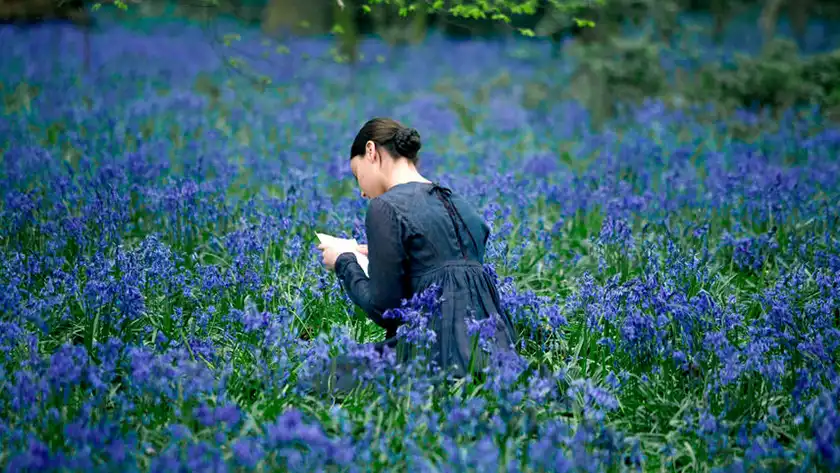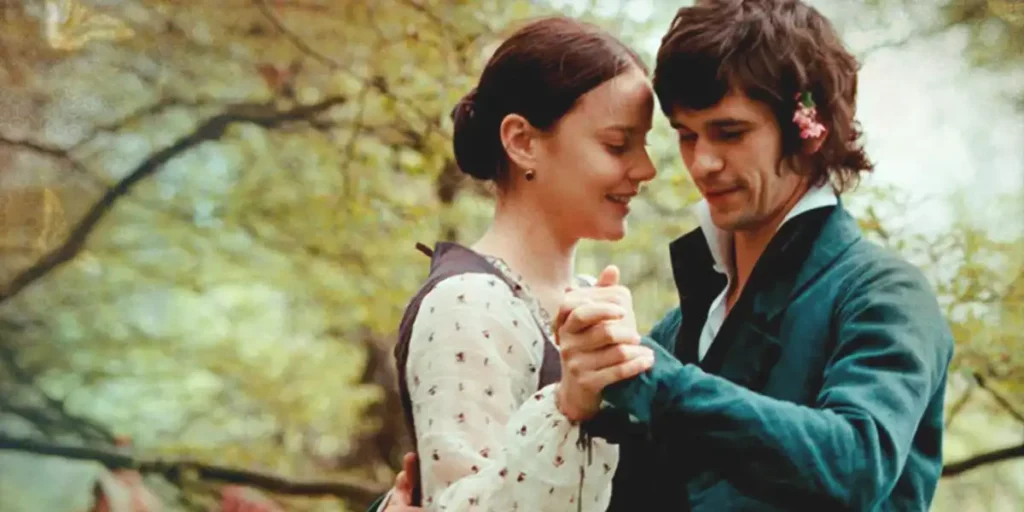Abbie Cornish and Ben Whishaw dazzle in Bright Star, Jane Campion’s sumptuous tale of a simple romance that inspired great art.
As a director, Jane Campion is surprisingly hard to pin down. She is one of the world’s most acclaimed female film directors, and champions the feminine in her films, but she’s never bogged down by staying in one mode or genre. 2009’s Bright Star was her first feature in six years, and was defiantly different from the features that preceded it, the violently ragged In The Cut, and the bracingly erotic Holy Smoke.
The period setting of Bright Star links it to earlier works like The Piano or The Portrait of a Lady, but there is a tenderness to this romance that neither of those films can claim. In retelling the love affair between the poet John Keats and his muse Fanny Brawne, Campion discovered a softness and simple joy that she has denied to her characters since An Angel At My Table, and which washes over the viewer like a balm.
Of course, Campion finds the heart of the tale in the feminine. Brawne (Abbie Cornish) is the focus of the story; the title comes from the poem of the same name that Keats (Ben Whishaw) wrote specifically for her. This focus on Brawne is a choice that immediately prevents Bright Star from falling into the patterns of a biopic. Keats is still regarded as one of the great English Romantic poets, and it is only fitting that the inspiration for some of his best-known works be explored. Campion’s mission in Bright Star is to make his inspirations and limitations known, rather than his methods. As the main couple, Abbie Cornish and Ben Whishaw are tasked with portraying a romance that is both passionate in nature, and chaste by necessity.
Every furtive glance and line of dialogue in Bright Star has to carry a meaning, and the leading pair absolutely sell the passion brimming under the surface. Cornish is wonderful as Brawne. Muses to artists are often portrayed as passive in their story, but her love for Keats is balanced by practicality. A talented seamstress, she wears her own designs and boasts of her ability to generate income from her work. In both presence and attitude, Cornish imbues Brawne with brawn. Meanwhile, Whishaw’s genteel speech and features make him an ideal Romantic figure. His poems express his passion, and Brawne repeats them to him with impressed awe. It is those slim features of Whishaw’s that attract Brawne to Keats, and also hint at the tragedy that will befall him.
In Bright Star, the practical world is a constant source of frustration. Brawne’s mother (Kerry Fox) frequently reminds her daughter of the family’s precarious finances, and that a relationship with the more penurious Keats would be disastrous. Meanwhile, Keats’ fellow poet Charles Brown (Paul Schneider in a bawdy performance) warns his friend that a relationship will sap his creative drive, rather than adding to it. But the couple are disinclined to heed their warnings, and Campion encourages them in their rebellion. They keep coming back to the joy of poetry and their love, ushered to it by cosy fireplaces and the companionship of nature. The proto-Dickensian setting, and the miseries therein, cannot prevent sunshine breaking through to find the couple exchanging sweet words.

Like The Piano and any number of other period pieces, this all risks becoming precious, but Campion is canny enough to keep the romance and the reality in a balance. Her wise and well-researched script knows love cannot be prescribed, nor can it guarantee happy ever after. Anyone familiar with Keats knows how this will end, and Bright Star doesn’t shy away from inevitability, but the ultimate point of the film is that love will sometimes blossom regardless. The happiness of the couple is reflected in the design and look of Bright Star.
Greig Fraser’s camerawork joins Keats in his Romanticism, bringing the natural to the fore in all its beauty. Hampstead Heath becomes a sundappled oasis in which Keats and Brawne can amble in love. A shot of Brawne walking through a field of violets sears itself on the mind as the flowers seem to meld with her purple dress. That dress is but one sample of Janet Patterson’s exquisite Oscar-nominated costume designs, as Fanny lets her joie de vivre be shown in her attire. Fanny smiles in love, and her world smiles with her.
Bright Star does little to entice anyone averse to Romanticism or romance, but it doesn’t have to. It knows its audience, and those who come to it expecting and wanting a period piece love story may be surprised by its acknowledgement of reality, but they will be drawn back by its tenderness, and the simmering passion under the surface of its two leads’ faces. Like Keats’ poems and Brawne’s outfits, Bright Star finds beauty in the practical, and stealthily dazzles all who encounter it.
Bright Star is now available to watch on digital and on demand. Discover more films in Jane Campion’s filmography with our reviews of The Piano, An Angel at My Table, Bright Star, and The Power of the Dog.

